SUPERSTITIOUS GREEKS
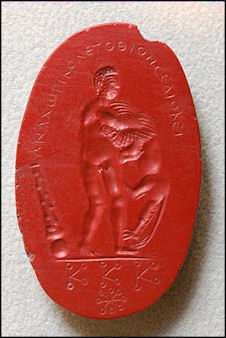
magical intaglioThe Greeks were very superstitious. Steve Coates wrote in the New York Times, “The Greeks don't deserve their reputation as rationalists. Religion and ritual permeated the world of the city-states. The scholar Joan Breton Connelly noted “there was no area of life that lacked a religious aspect," citing one estimate that 2,000 cults operated during the classical period in the territory of Athens alone.
In the Characters Theophrastus describes a man who "won't go out for the day without washing hands...and putting a piece of laurel leaf from a temple in his mouth. If a cat crosses the road he won't go any further until someone else passes or he has thrown three stones across the road. If he sees a snake in his house, he calls on Sabazius, if it is one of the red variety; if its one of the sacred sort he builds a shrine on the spot...If he hear an owl hoot while he's out walking he is much shaken and won't go past without muttering 'All power is Athene's." ["World Religions" edited by Geoffrey Parrinder, Facts on File Publications, New York]
"Every month on the forth and seventh he gives instructions for wine to be mulled for his family...Every time he has a dream he rushes to the dream experts...If ever he sees one of the figures of Hecate...with a wreath of garlic, he rushes straight home to wash his head, and sends for a priestesses, and tells them to purify him by carrying around a puppy." [Ibid]
Socrates feared the evil eye. Alexander the Great used fortunetellers used haruspicy (searching for omens in the entrails of animals) to predict the future. The Athenian leader Pericles once lost two armies because two medicine men told him he should not move his army until "thrice nine" days after lunar eclipse. Plutarch once wrote that superstitious "word and gestures, sorcery and magic, running backwards and forward" drove reasonable men to atheism.
Greeks believed in the magic spells of the sorceress Medea. Chance was a Greek goddess. Pliny said "We are much at the mercy of Chance that Chance is our god." The sphinx represented prophecy.
Ancient Greek Superstitions and Fortunetellers

Magic Engainion of an ancient Greek_houseThe superstition that spilling salt is bad luck and the custom of throwing salt over one's shoulder could cancel bad luck was practiced by the ancient Sumerians, Egyptians, Assyrians and later the Romans and Greeks. The custom is believed to have been practiced since 3500 B.C. Knocking on wood is said to date back to ancient Greece
Triskaidekaphobia , the fear of the number 13, is named after the first man to be recorded of having a fear of that number, Triskaideskaphodes. According to ancient numerology 12 was the perfect number where everything was in balance. There were 12 months, 12 hours in the day, 12 signs on the zodiac, 12 gods at Olympus, 12 tribes of Israel, 12 Apostles of Jesus, 12 days of Christmas, and 12 gods at Olympus. The number "13" upset the balance of the number "12" and therefor was viewed as unlucky and evil. Friday the 13th became an especially unlucky day because Jesus was crucified on a Friday and some say Eve gave Adam the apple on a Friday. In 1969 a 13-year-old Eton school boy named S.R. Baxter proved that the "13th of the month is more likely to be a Friday than any other day."
Greeks believed that any person who intentionally or accidently ate the meat from a human mixed with blood or flesh of a sacrificed animal would turn into a werewolf. The werewolf cult of Zeus Lykaios was strong in Peloponnesian Arcadia.
Plato wrote: "Begging priests soothsayers go to the doors of the wealthy and convince them that if they want to harm an enemy, at very little expense, whether he deserves it or not, they will persuade the gods through charms and binding spells to do their bidding." Plato advocated ending the practice by executing curse writers and imposing heavy fines on their clients.
Ancient Greek Curses
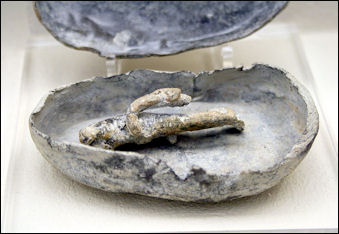
Curse inscriptionThe ancient Egyptians, Mesopotamians, Greeks, Romans, Persians, Jews, Christians, Gauls and Britons all dispensed curse tablets used placate "unquiet" graves, cast love spells and call up the spirits of the Underworld to make trouble. [Source: Christopher A. Faraone, Archaeology, March/April 2003]
Curse objects were used to call ghosts from the Underworld to bring suffering on one's enemies. They were often buried with the dead who were believed to have the power to pass them on to a party that could carry them out. Curses buried with people who died young were thought to be able to reach their destination quicker. Curses became such an annoyance in Athens they were outlawed. Even so they were secretly buried on the dead.
It is not clear what kinds of punishments there were if one was caught putting a curse on someone. One of Plato's dialogues asserts that “if it be held that a man is acting like an injurer by these of spells, incantations or any such mode of poisoning, if he be a prophet or diviner, he shall be put death." In this passage Plato's character thinks that practitioners of black magic should be punished but in Greek and Roman law investigations of magic was only done if it was involved in a serious crime such as murder.
Ancient Greek Voodoo Dolls
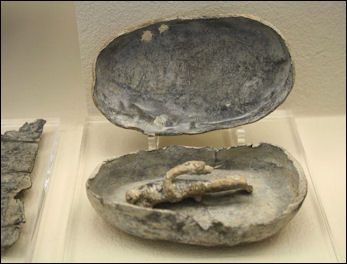
Curse inscriptionArchaeologists have found ancient Greek "voodoo dolls" called kolossoi , consisting of a small doll lying in a lead coffin. One such doll had its arms pulled back and a man's name inscribed on its leg. The man appeared to have been involved with a public trial with eight other men, whose names were inscribed on the coffin lid. Kolossoi figures have been found buried in a cemetery, but not inside graves, perhaps to draw the attention of Hades, god of the Underworld.
In Antinopolis, Egypt, a small effigy of woman, dated to the A.D. 4th century was found kneeling with her feet together and her arms tied behind her back. She is pierced with 13 pins: one in the top of her head, one in the mouth, one in each eye and one in each ear, one each in the solar plexus, vagina and anus, and one in the palm of each hand and in the soles of each foot. The effigy was wrapped in an inscribed table and sealed in a pit.
The doll surprisingly was commissioned by a man who wanted a the victim, a woman, to make live to him. The text of the tablet read: “Lead Ptolemasi, who Aias bore, the daughter of Horigense, to me. Prevent her from eating and drinking until she comes to me. Sarapammon, whom Area bore, and do not allow her to have experience with another man, except me alone. Drag here by her hair, by her guts, until she does not stand aloof from me."
A magical handbook that has been found, dated to around the same time, has an image of a nearly identical effigy with instructions on where to place it and what to recite when doing so. The idea it seems was to cause the woman anguish so she would have feelings of affection for the man who pieced the doll.
Ancient Greek Curse Tablets

Curse inscriptionArchaeologists have found hundreds of ancient Greek curse tablets, which the Greeks called them katares , “curses that bind tight," and they appear to have invented them with a great number focused on sporting competitions or legal contests. “To make such a “binding spell," Christopher A. Faraone wrote in Archaeology magazine, “one would inscribe the victim's name and a formula on a lead tablet, fold it up, often pierce it with a nail, and then deposit it in a grave or a well or a fountain, placing it in the realm of ghosts or Underworld divinities who might be asked to enhance the spell."
Many ancient Greek curse tablets made of lead have been found. By far the most have come from Athens, where they have been found buried in cemeteries, inside sanctuaries and wells and outside theaters. They were purchased by shopowners, potters and tavern owners against rivals. Most were aimed at legal opponents. Some were directed at politicians. Many were accompanied by figures: a soldier with a bent sword a man with his hands tied behind his back, creatures with birdlike heads and pronounced sex organs. Many curses were put on bracelets buried with the dead.
Early curse tablets were filled with spelling and grammar mistakes which has led archaeologists and historians to surmise they were probably inscribed by amateurs, but there are hints of professional sorcerers making spells as early as 400 B.C. A passage from Plato's Republic goes: “And then there are the begging priests and soothsayers, who going to the doors of the wealthy persuade them that...if anyone wants to harm an enemy, whether the enemy is a just or unjust man, they [the priest and soothsayers], at very little expense, will do it with incantations and binding spells, once [they claim] they have persuaded the gods to do their bidding."
Book: Curse Tablets and Binding Spells from the Ancient World by John Gager, professor or religion at Princeton (Oxford University Press, 1998)
Texts of Ancient Greek Curse Tablets
A spell from Attica in the 4th century B.C. read: "I bind Kalais, the shop-tavern keeper who is one of my neighbors and his wife, Tahittra and the shop-tavern of the bald man and the shop-tavern of Anthemion and Polon the shop-tavern keeper. Of all of these I bind the soul, the work, the hands, tying and mind: all of these I bind to Hermes the Restrainer."
Another read: "I inscriber Selinonitios and the tongue of Selinontios, twisted to the point of uselessness." A Hellenistic curse read: "I will tattoo you with pictures of terrible punishments suffered by the most notorious sinners in Hades! I will tattoo you with the white-tusked boar." Curses aimed at unfaithful lovers was common in Hellenistic Greece.

Dodona curse inscription
On dealing with the testimonies of three butchers in a court of law one tablet read: “Theagues, the butcher, I bind his tongue, his soul and the speech he is practicing. Pyrrhias: bind his tongue, his soul and the speech he is practicing. I bind the wife of Pyrrhias, her tongue and soul. I also bind Kerkion, the butcher, and Dikimos the butcher, their tongues, their souls and the speeches they are practicing. I bind Kineas, bind his tongue, his soul and the speech he is practicing with Theagenes. And Pherekles. I bind his tongue, his soul and the evidence he gives for Theagenes. All of these (i.e. their names) I bind, I hide, I bury, I nail down. If they lay any counterclaim before the arbitrator or the court let them seem to be of no account, either in word or deed."
Ancient Greek Love Tablets
A curse that focuses on erotic love found on a potsherd perhaps heated in a ritual read: “Burn, torch the soul of Allous, her female body, her limbs, until she leaves the household of Apollonius. Lay Allous low with fever, with unceasing sickness, lack of appetite, senselessness."
The text of one Greek curse found rolled up in the mouth of a red-haired mummy found in Eshmunen in Ptolemaic Egypt read: “Aye, lord demain, attract, inflame, destroy, burn, cause her to swoon from love as she is being burnt, inflamed. Goad the tortured soul, the heart of Karosa...until she leaps forth and comes to Apalos...out of passion and love, in this very hour, immediately. Immediately, quickly, quickly...do not allow Karosa herself...to think of her [own] husband, her child, drink, food, but let her come melting for passion and love and intercourse, especially yeaning for the intercourse of Aapalos."
One tablet addressed to a ghost goes: “Seize Euphemia and lead her to me Theon, loving me with mad desire, and bind her with unloosable shackles, strong ones of adamantine, for the love of me, Theon, and do not allow her to eat, drink, obtain sleep, jest or laugh but make her leap out...and leave behind her father. Mother, brothers, sisters, until she comes to me...Burn her limbs, live, female body, until she comes to me, and not disobeying me."
_4th_Century.jpg)
Magic Pella leaded tablet (katadesmos) 4th_Century
Ancient Greek Astrology
The Egyptians refined the Babylonian system of astrology and the Greeks shaped it into its modern form. The Ancient Greeks were skeptical about astrology. They wondered, for example, why twins born under the same astrological conditions had different fortunes, and why animals weren't ruled by the same cosmic powers as humans. [Source: "The Discoverers" by Daniel Boorstin,"]
Astrology as we know it originated in Babylon. It developed out of the belief that since the Gods in the heavens ruled man's fate, the stars could reveal fortunes and the notion that the motions of the stars and planets control the fate of people on earth. The motions of the stars and planets are mainly the result of the earth's movement around the sun, which causes: 1) the sun to move eastward against the background of the constellations; 2) the planets and moon to shift around the sky; and 3) causes different constellations to rise from the horizon at sunset different times of the year.
In ancient times astrology and astronomy were the same thing. The Babylonians were the first people to apply myths to constellations and astrology and describe the 12 signs of the zodiac. The Egyptians refined the Babylonian system of astrology and the Greeks shaped it into its modern form. The Greeks and Romans borrowed some of their myths from the Babylonians and invented their own. The word astrology (and astronomy) are derived from the Greek word for "star."
The names and shapes of many the constellations are believed to date to Sumerian times because the animals and figures chosen held a prominent place in their lives. It is thought that if the constellations originated with the the Egyptians were would ibises, jackals, crocodiles and hippos---animals in their environment---rather than goats and bulls. If they came from India why isn't there a tiger or a monkey. To the Assyrians the constellation Capricorn was munaxa (the goat fish).
The Greeks added names of heroes to the constellations. The Romans took these and gave them the Latin names we use today. Ptolemy listed 48 constellations. His list included ones in the southern hemisphere, which he and the Mesopotamians, Egyptians, Greeks and Romans couldn't see.
Book: Astrology: A History by Peter Whitfield (Abrams, 2001).
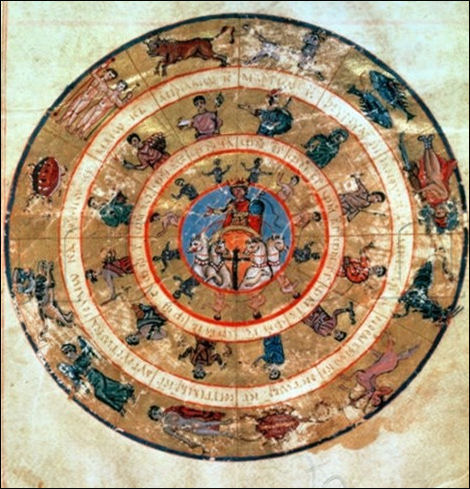
Ptolemy zodiac
Greek Zodiac
The word zodiac comes from a Greek word meaning, "The circle of animals". The animals representing the signs were placed among the stars usually for great acts of heroism. [Source: Whats-your-sign.com/zodiac-signs-and-meanings and spiffy-entertainment.com/zodiac]
Aries - The Ram (March 21--April 19). Aries people are creative, adaptive, and insightful. They can also be strong-willed and spontaneous (sometimes to a fault). Aries people can be driven and are very ambitious often making them over-achievers in anything they set their mind to tackle. Aries are fire signs, and so too is their personality. They may be quick to anger, but don't take it personally, it's just their fiery, passionate personalities showing through. Aries signs have excellent sense of humor, and they get along with almost everyone at the party (and they DO know how to party). Aries can be impatient, but we love them anyway because they are devoted friends, lovers and family members---they are loyal to then end and will fight for their causes (usually supporting the underdog). See symbolic meanings of the Ram here. [Source: Whats-your-sign.com/zodiac-signs-and-meanings]
The origin of Aries stems from the tale of the Golden Ram. In a plot to trap the centaur Ixion, Hera created a woman looking nearly identical to herself out of a cloud and named her Nephele. She then forced King Athamus to marry this woman. This relationship didn't work out at all as Athamus became bored with Nephele fairly quickly and left her. Athamus almost immediately after this, married Ino. This of course angered Nephele, so she asked Hera for vengeance. Hera had no problem in doing this as she was already angry at Athamus and Ino already as a cause of them taking care of Dionysus for Zeus. Hera then proceeded to poison their minds and make them crazy. Athamus attempted to sacrifice his son by Nephele, Phrixius. This plot was thwarted when Heracles sent a Golden Ram to save him. When the ram brought Phrixius to his destination, he sacrificed the Golden Ram to Zeus and in turn, Zeus placed the mighty ram among the stars for his heroic deed. It is also from this ram that the Golden Fleece from the tale of Jason & the Argonauts came from. [Source: spiffy-entertainment.com/zodiac]
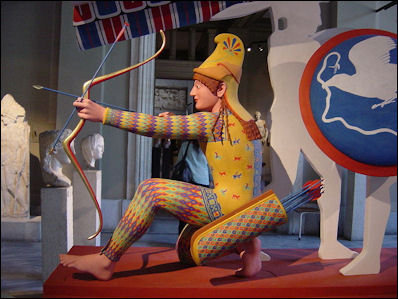
AriesTaurus - The Bull (April 20--May 20). Taurus zodiac signs and meanings, like the animal that represents them, is all about strength, stamina and will. Stubborn by nature, the Taurus will stand his/her ground to the bitter end (sometimes even irrationally so). But that's okay because the Taurus is also a loving, sympathetic and appreciative sign. The Taurus is very understanding and when we need someone to unburden ourselves to, we often share our deepest fears with the Taurians of the zodiac. Taurians are very patient, practical and efficient, they are excellent in matters of business and are also wonderful instructors/teachers. Although initially they may have their own best interest at heart, they are ultimately & endlessly generous with their time, possessions and love. [Source: Whats-your-sign.com/zodiac-signs-and-meanings]
The sign of Taurus stems from the Tale of Europa and the Bull. This is a tale of one of Zeus' many affairs. Zeus was extremely attracted to Europa and yearned for her affection. Zeus then appeared before Europa in the form of a magnificent white bull. Europa couldn't resist petting the bull, so she walked over to it and did just that. She then climbed upon the bull's back at which point the bull carried Europa across the sea to Crete where he then took the form of an eagle and, for a lack of better terms, raped her. In rememberance of this affair, Zeus placed the image of the bull amongst the stars. [Source: spiffy-entertainment.com/zodiac]
Gemini, Cancer and Leo
Gemini - The Twins (May 21 - June 20). Flexibility, balance and adaptability are the keywords for the Gemini. They are quick to grasp the meaning of a situation and act on it, often with positive effects. They tend to have a duality to their nature, and can sometimes be tough to predict how they will react. They can turn from hot to cold and may be prone to noticeable mood swings. However, they are generous signs with tendencies of being affectionate, and imaginative. They also inspire others easily as they seem to naturally motivate themselves---their charisma and accomplishments are infectious. Geminians are very supportive, and are especially good at promotions, sales, and driving hard bargains. [Source: Whats-your-sign.com/zodiac-signs-and-meanings]
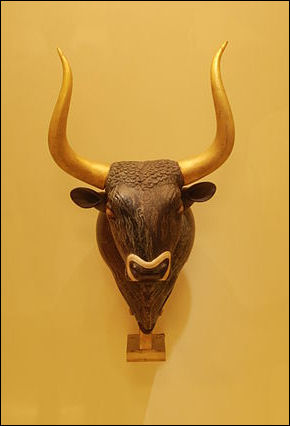
TaurusThe Gemini sign stems from the Tale of Castor and Pollux. Castor and Pollux were half-brothers. Castor was born of Tyndareus and Leda, Pollux was born of the affair between Zeus and Leda (also known as the Tale of Leda and the Swan). The twins grew inseperable as time went on. One day, Castor was killed in a battle. Pollux was so grief stricken that he took his own life to join his brother at death. In honor of the brothers' great love, Zeus placed them among the stars. [Source: spiffy-entertainment.com/zodiac]
Cancer - The Crab (June 21--July 22). Cancerians love home-life, family and domestic settings. They are traditionalists, and enjoy operating on a fundamental level. They love history, and are fascinated with the beginnings of things (heraldry, ancestry, etc.). The moon is their ruler, so they can be a bit of a contradiction and sometimes moody. However, they are conservative, so they'll be apt to hide their moods from others altogether. They have a reputation for being fickle, but they'll tell you that isn't true, and it's not. Cancerians make loyal, sympathetic friends. However Cancerians need alone time, and when they retreat, let them do so on their terms. The sign of Cancer stems from one of the 12 Trials of Heracles. While battling the Hydra, Hera sent down a giant crab to thwart his efforts. The crab was only a nuisance at most as Heracles simply crushed the crab under his foot just before he defeated the Hydra. Hera honored the crab's attempt at stopping her most hated of Zeus' children by placing it amongst the stars. [Source: Whats-your-sign.com/zodiac-signs-and-meanings and spiffy-entertainment.com/zodiac]
Leo - The Lion (July 23--August 22). The zodiac signs and meanings of Leo is about expanse, power and exuberance. Leos are natural born leaders, and they will let you know it as they have a tendency to be high-minded and vocal about their opinions. That's okay, because if you observe, the Leo is usually correct in his/her statements. Leos have a savvy way of analyzing a situation and executing swift judgment with a beneficial outcome. It comes from being a leader. They are brave, intuitive, and also head-strong and willful. Beneath their dynamic persona lies a generous, loving, sensitive nature that they do not easily share with others. They might be a bit bossy, but those who know them understand this comes from a source need to do good, not (usually) from an inflated ego. The sign of Leo stems from yet another of Heracles 12 trials. Leo of course represents the Lion of Nemea which was Heracles' first trial. The lion couldn't be defeated by any weapon. Heracles eventually battled the lion hand to hand (or maybe paw) and strangled the lion to death. In rememberance of the grand battle, Zeus placed the Lion of Nemea amongst the stars. [Source: Whats-your-sign.com/zodiac-signs-and-meanings and spiffy-entertainment.com/zodiac]
Virgo, Libra and Scorpio
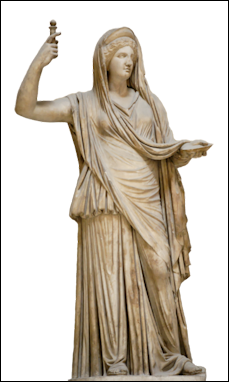
VirgoVirgo - The Virgin (August 23--September 22). Virgos have keen minds, and are delightful to talk with, often convincing others of outlandish tales with ease and charm. Virgos are inquisitive and are very skilled at drawing information from people. This trait also makes them naturally intuitive. Combine this with their remarkable memories, and we see an advanced, analytical personality. However the Virgo needs balance in their lives otherwise they may become short-tempered, impatient and self-serving. Virgos are excellent teammates in work and social activities. They work well with others, although they freely express their opinions (even when unwarranted). [Source: Whats-your-sign.com/zodiac-signs-and-meanings]
One of the few signs not represented by an animal, Virgo's origin stems from the Tale of Pandora. Virgo of course is the representation of the goddess of purity and innocence, Astraea. After Pandora opened the jar and let loose all the evil's unto the world, the gods who lived on the earth fled back to the heavens and away from the evil's of the earth. Astraea was the last to return to the heavens. As a rememberance of innocence lost, Astraea was placed amongst the stars in the form of Virgo. [Source: spiffy-entertainment.com/zodiac]
Libra - The Scales (September 23--October 22). As their zodiac signs and meanings would indicate, Libras are all about balance, justice, equanimity and stability. They easily surround themselves with harmony and beauty, but sometimes go to extremes to do so if their goals are unreasonable or unhealthy. With Venus as their ruling planet, Libras are very understanding, caring, and often the champion of underdogs. They have keen intuitions, but often don't give themselves enough credit for their perceptions. They can be quiet and shy if not persuaded to come out of their shell. Ironically and in spite of their introverted nature they make excellent debaters, often proving a point from out of seemingly nowhere. Libra are the scales that balance justice. They are held by the goddess of devine justice, Themis. Why exactly she is placed among the stars I haven't yet found out, but it is interesting that Libra shines right beside Virgo which represents Astraea, daughter of Themis. [Source: Whats-your-sign.com/zodiac-signs-and-meanings and spiffy-entertainment.com/zodiac]
Scorpio - The Scorpion (October 23--November 21). The Scorpio is often misunderstood. These personalities are bold and are capable of executing massive enterprises with cool control and confidence. They can surmount seemingly all obstacles when they put their mind to the task, and they have unshakable focus when the situation calls for it. Regardless of their bold nature, they are often secretive, but they are always observing behind their withdrawn manner. Being associated with a solar animal, (the scorpion) they are not withdrawn for long, and when they come out again they do so with force, vigor and determination. It is true, Scorpios can be argumentative and pack a powerful sting, but that's simply because they see all opposition as a healthy challenge. [Source: Whats-your-sign.com/zodiac-signs-and-meanings]
The sign of Scorpio stems from the Tale of Orion. Orion was the son of Poseidon and Euryale. Orion was also a favored hunting partner by Artemis which made her brother Apollo very envious. Apollo pleaded to Gaea to create a giant scorpion to kill Orion. Gaea obliged, and the scorpion stung and killed great Orion. In rememberance of this struggle, Zeus placed Orion and the scorpion amongst the stars. [Source: spiffy-entertainment.com/zodiac]
Sagittarius, Capricorn, Aquarius and Pisces
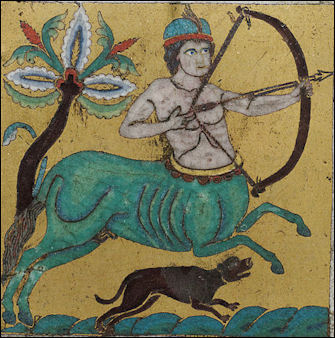
SagittariusSagittarius - The Centaur (November 22--December 21). Here we have the philosopher among the zodiac signs and meanings. Like the Scorpio, they have great ability for focus, and can be very intense. However, they must channel their energy or they will waste time and wear themselves out going in too many directions at once. They are not very patient and expect quick results. However, when encountered with failure they make extreme comebacks often against incredible odds. They make loyal friends and lovers, but they do not handle commitment well as they refuse to be tied down while chasing philosophical pursuits. [Source: Whats-your-sign.com/zodiac-signs-and-meanings]
The Sagittarius sign is representative of the centaur, Cheiron. Cheiron was a friend of many great hero's in Greek mythology such as Achilles and Heracles. Speaking of Heracles, some friend he turned out to be. While hunting, Heracles accidently shot Cheiron in the leg with a poison arrow. Cheiron was immortal so he couldn't die, he just had to take the unending pain. Heracles promised to help him somehow. Upon his ventures, Heracles came upon Prometheus who was trapped with no way of escape. The only way Prometheus could be set free was for someone else to take his place. Cheiron wanted only to be relieved of his insufferable pain, so he took Prometheus' place and died. In honor of the noble act, Zeus placed Cheiron amongst the stars. [Source: spiffy-entertainment.com/zodiac]
Capricorn - The Goat (December 22--January 19). Capricorns are also philosophical signs and are highly intelligent too. They apply their knowledge to practical matters, and strive to maintain stability and order. They are good organizers, and they achieve their goals by purposeful, systematic means. They are very intuitive, although they don't share this trait with others freely. They do not deal well with opposition or criticism but a healthy Capricorn will often shrug off negative comments towards their character. They are patient and persevering---they know they can accomplish any task as long as they follow a their plan step-by-step. Capricorns have broad shoulders, and typically take on other's problems with aplomb. Ironically, they rarely share their own problems and tend to go through bouts of inner gloom after a spell of dwelling on these problems. The sign of Capricorn represents the goat Amalthea who fed the infant Zeus. It's said that Zeus placed her among the stars in gratitude. Other accounts say that Capricorn represents Pan, the god of the forest, woodlands, and nature. [Source: Whats-your-sign.com/zodiac-signs-and-meanings and spiffy-entertainment.com/zodiac]
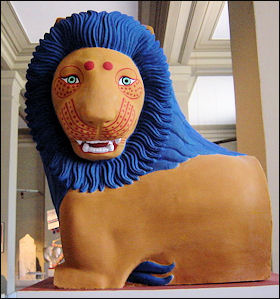
LeoAquarius - The Water Bearer (January 20--February 18). Often simple and unassuming, the Aquarian goes about accomplishing goals in a quiet, often unorthodox ways. Although their methods may be unorthodox, the results for achievement are surprisingly effective. Aquarians will take up any cause, and are humanitarians of the zodiac. They are honest, loyal and highly intelligent. They are also easy going and make natural friendships. If not kept in check, the Aquarian can be prone to sloth and laziness. However, they know this about themselves, and try their best to motivate themselves to action. They are also prone to philosophical thoughts, and are often quite artistic and poetic. The sign of Aquarius stems from the Tale of the Deucalion Flood. In this tale, Zeus pours all the waters of the heavens onto earth to wash away all the evil beings. Deucalion and Pyrrha then threw stones over their shoulders and created a new race of mankind. [Source: Whats-your-sign.com/zodiac-signs-and-meanings and spiffy-entertainment.com/zodiac]
Pisces - The Fish (February 19--March 20) Also unassuming, the Pisces zodiac signs and meanings deal with acquiring vast amounts of knowledge, but you would never know it. They keep an extremely low profile compared to others in the zodiac. They are honest, unselfish, trustworthy and often have quiet dispositions. They can be overcautious and sometimes gullible. These qualities can cause the Pisces to be taken advantage of, which is unfortunate as this sign is beautifully gentle, and generous. In the end, however, the Pisces is often the victor of ill circumstance because of his/her intense determination. They become passionately devoted to a cause--particularly if they are championing for friends or family. Pisces represents the goddess of love & beauty, Aphrodite and the god of love, Eros. While taking a stroll down the Euphrates River, they had an encounter with the vicious Typhon. They pleaded to Zeus to help them escape, so Zeus changed the two into fish and they swam away to safety. In rememberance of this, Athena placed the twin fishes amongst the stars. [Source: Whats-your-sign.com/zodiac-signs-and-meanings and spiffy-entertainment.com/zodiac]
Ancient Greek Funerals
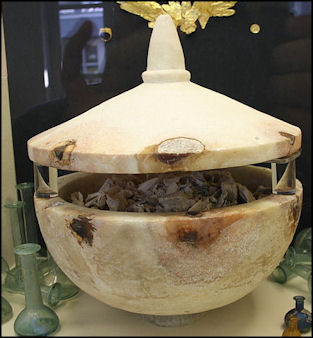
marble ossuaryThe Greeks believed that dying unmourned was worse than death itself. Funerals were often elaborate and expensive. The body was usually anointed and wrapped in a shroud by the women in the family, then placed in a bier and carried through town. Emotional outpourings were expected and often families hired mourners to create as big a spectacle as possible. The practice later got to be so out of hand in Rome that professional mourners were banned."[Source: "Greek and Roman Life" by Ian Jenkins from the British Museum,"|]
The Greeks and Romans were not exactly sure what the relationship was between a dead person's body and his soul. To made sure that they body was well taken care of, just in case the soul continued to linger in the body for a while, families of the deceased often stuck a long straw into the tomb and occasionally poured down food and drink to the dead.
For important people, sometimes funerary games were held. They were described in the Iliad . In the early days large feast were often held on the death days of important heros.
There were special cults that had special rites for the dead. In most cases these cults were very secretive and no information about their rituals or even the cults themselves has survived.
Ancient Greek Cremations and Burials
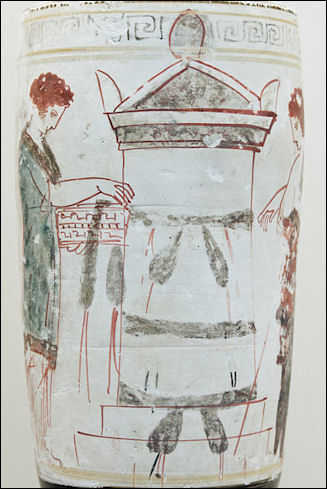
Visiting a graveCremations were usually reserved for adults, although they were sometimes performed on children. Sometimes relatives of the deceased sucked down wine from a decorated bowl and then tossed the bowl into the cremation fire. In Ptolemaic Egypt the dead were sometimes mummified.
The dead were mostly buried in the Earth in jars or coffins. The word coffin come from the Greek word kophinos , meaning "basket." Greek graveyards have been found with newborns buried between clay roof tiles.
Sometimes families raised elaborate funerary monuments for the deceased but great tombs are associated more with the Romans than the Greeks. Funeral wreaths placed on tombs were hung with bronze leaves, terra-cotta berries, grapes, grasshoppers and cicadas.
Greeks were buried with bronze nutcrackers and boat-shaped gold earrings, bottles of perfume, and ivory dolls. Some soldiers were buried wearing a helmet and a golden mask. To deter the ghost of a suicide victim ancient Athenians severed the hand and buried it apart from the body.
Image Sources: Wikimedia Commons, The Louvre, The British Museum
Text Sources: New York Times, Washington Post, Los Angeles Times, Times of London, Yomiuri Shimbun, The Guardian, National Geographic, The New Yorker, Time, Newsweek, Reuters, AP, Lonely Planet Guides, Compton's Encyclopedia and various books and other publications. Most of the information about Greco-Roman science, geography, medicine, time, sculpture and drama was taken from "The Discoverers" [∞] and "The Creators" [μ]" by Daniel Boorstin. Most of the information about Greek everyday life was taken from a book entitled "Greek and Roman Life" by Ian Jenkins from the British Museum [||].
No comments:
Post a Comment